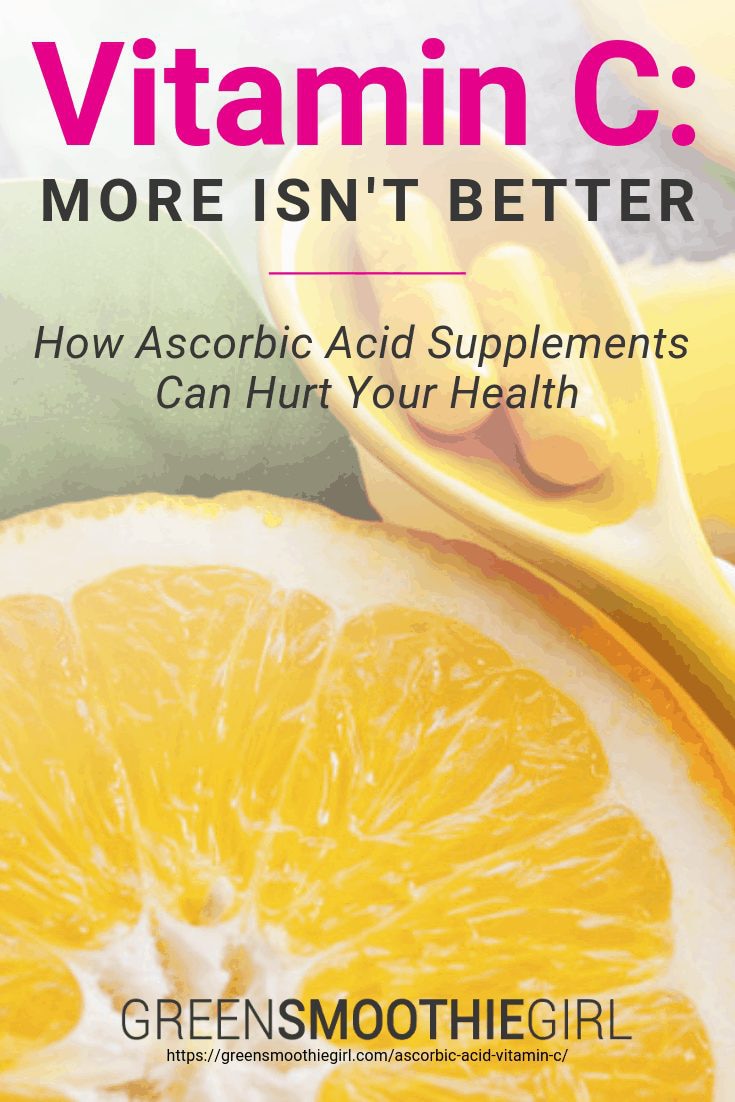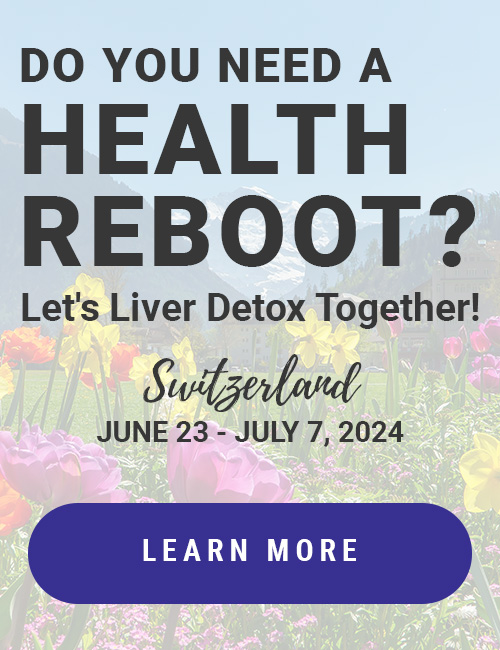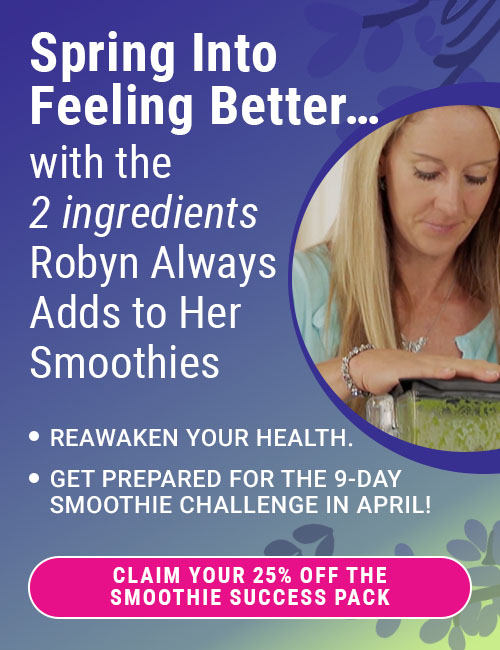Vitamin C: Ascorbic Acid Supplements Can Hurt Your Health

When it comes to food, we intuitively know that quantity matters. Eating or drinking too much of anything can be harmful to your health. After all, even water can kill you1 if you drink too much of it, too quickly!
Also, any nutrient found naturally in foods, when isolated from the synergistic effect of the complete food (especially when toxic substances are used in manufacturing the isolate) may not yield the results you’re hoping for. Which brings us to ascorbic acid, sold as “Vitamin C.”
While REAL Vitamin C (the kind you’ll find in an orange) isn’t on trial, new studies show that synthetic ascorbic acid--the poster child of never-too-much supplements-- can have serious negative consequences for your health.
Let’s talk about the difference between Vitamin C and ascorbic acid, how ascorbic acid found its way into so many “Vitamin C” supplements, and why it can hurt your health.
In this post:
- Vitamin C vs. Ascorbic Acid
- So, What's Wrong with Ascorbic Acid?
- Meet the Man who Started the Vitamin C Craze
- Risks of Vitamin C Supplements in the Form of Ascorbic Acid
- How Much Vitamin C Do We Really Need?
- How the Body Uses REAL Vitamin C
- Healthy Sources of Vitamin C
- How to Avoid Synthetic Vitamin C Supplements
- Summary: The Trouble with Ascorbic Acid
Vitamin C vs. Ascorbic Acid
It’s really important to get this straight, right off the bat. Vitamin C and ascorbic acid are two different substances. That distinction can be confusing, especially because if you walk down the pharmacy aisle, or even check the supplements in a health food store, you’re going to see the two used interchangeably on some labels.
To clarify, Vitamin C is the good stuff. It’s the complete vitamin found in an orange, broccoli, or spinach.
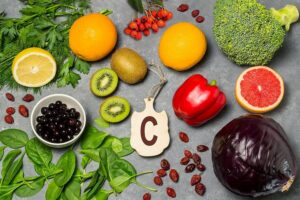
Is ascorbic acid really a good substitute for the Vitamin C found in plant food?
Ascorbic acid, on the other hand, is one component of Vitamin C, which can be isolated— and synthetically manufactured en masse. Albert Szent-Gyorgyi won a Nobel Prize in 1930 when he discovered and isolated ascorbic acid from red peppers.
But interestingly enough, even in 1930 Gyorgyi noted that the ascorbic acid wasn’t as bioavailable or active when it was removed from the red pepper.2 And that was just the tip of the iceberg for this synthetic “vitamin.”
So, What’s Wrong with Ascorbic Acid?
The short answer is, “absolutely nothing.” Real ascorbic acid is pretty darn important— when it’s part of naturally-occurring Vitamin C. Ascorbic acid in Vitamin C plays a critical role in heart health, immune function, brain health, wound healing, and cell repair and growth3 (more on this below).
But here’s the problem: It’s not very cost effective to extract real ascorbic acid from foods like peppers, cranberries, and acerola berries.

Ascorbic acid is found naturally in plant foods like cranberries, but expensive to extract.
What is cost effective? Synthetic ascorbic acid that’s created in a lab using corn syrup and hydrochloric acid.4 Unfortunately (and unsurprisingly) this frankenstein of ascorbic acid is 35% less bioavailable5 and can even be downright dangerous.
So why is this manufactured substance, found in everything from supplements to gummy snacks, so popular?
Meet the Man Who Started the Vitamin C Craze
Ascorbic acid’s biggest champion was a man by the name of Linus Pauling, one of the most influential scientists in the 20th century, and a hero in so many ways. Pauling spent much of his career steering people toward high doses of “Vitamin C’ in the form of manufactured ascorbic acid (which he believed could treat cancer).
Pauling’s ideas caught on like wildfire. Why bother peeling an orange when you can pop a pill? Besides, the high doses of ascorbic acid Pauling recommended would have required eating 50 or more oranges per day.
But unfortunately, there’s an unhappy end to this story. Not recognizing that synthetic isolates were inferior to vitamin C from natural sources, Pauling remained steadfast in his research, which was funded by the corporate giant Hoffman-La Roche (uncoincidentally, one of the largest manufacturers of ascorbic acid). And after a lifetime of taking massive amounts of ascorbic acid himself, Pauling died of cancer.
Until recent scientific studies challenged the wisdom behind Pauling’s mega-doses of ascorbic acid, generations of folks have taken trillions of doses of these “vitamins” in search of better health.

Chemist Linus Pauling played a key role in popularizing ascorbic acid.
Risks of Vitamin C Supplements in the Form of Ascorbic Acid
Since 1930, scientists have been hard at work tweaking synthetic ascorbic acid in an effort to make it better — like adding bioflavonoids or making it fat soluble instead of water soluble.
The result is ascorbic acid that can be taken in larger quantities without causing major diarrhea (not true of the ascorbic acid of yesteryear) and seems to be absorbed better (still a measly 35%-55%,5 compared with the 70-90% absorption of naturally occurring Vitamin C).
Unfortunately, this “new and improved” synthetic ascorbic acid is still just a manufactured frankenstein. Dr. David Friedman, author of the book Food Sanity said in a podcast interview with Vibe:6
The Mount Sinai School of Medicine did a study that said that Vitamin C causes genetic damage to your genes and offspring. I read this while I was taking 3000 milligrams of Vitamin C a day.
A PhD friend of mine who worked at Takeda (an ascorbic acid plant near my home) became a patient of mine. I asked him what he thought about this study--about synthetic ascorbic acid causing genetic damage. You know what he said? "Oh, it wouldn’t surprise me. If you knew what we make that stuff with, you would understand."
He added, "I don’t touch it." Then proceeded to spit out all these chemicals that are used. Acetone, the same stuff used to make nail polish. Benzene, which you’ll find in gasoline. Chlorine and Clorox. Perchloric acid, which is used to make rocket fuels and explosives.
It shouldn’t come as much of a surprise, then, that the trend of taking this chemical-derived synthetic ascorbic acid in large quantities can be extremely detrimental to your health. (Key word: SYNTHETIC. There are a number of high-quality vitamin C supplements from whole-food sources that we’ll talk about below.)
Deteriorating Heart Health
One recent study demonstrated that doses of 500 mg a day or more of ascorbic acid increase the incidence of arterial plaque buildup and thicker arteries.7 In other words, taking synthetic ascorbic acid can increase your risk of heart attack, heart disease, and high blood pressure.
[Related: Green Smoothies For High Blood Pressure Control]
Kidney Stones
Taking high doses of ascorbic acid has also been linked to the formation of kidney stones.8 A long-term study of 23,000 Swedish men showed that those who regularly took ascorbic acid supplements were twice as likely to suffer from kidney stones.

High doses of ascorbic acid have been linked to a higher risk for kidney stones.
Cancer
Ever hear Vitamin C supplements touted as antioxidants that can help fight cancer cells? While that’s true of real Vitamin C, it’s simply not true of manufactured ascorbic acid.
A wide-scale review of numerous studies and articles concluded that even high doses of ascorbic acid were ineffective in treating cancer.9 Not only that, but large quantities of ascorbic acid have actually been found to protect cancer cells.10
Another study published in Science showed that high doses of ascorbic acid can lead to the formation of genotoxins11 — or chemicals that damage the genetic information inside cells and lead to mutations — a fast track to cancer.
Reduced Endurance
Yet another study showed that athletes who took 1000 mg of Vitamin C daily12 were unable to compete as long or as intensely as their peers, because the high dose prevented cells from adapting properly to exercise.
System Imbalances
It should come as no surprise that taking a sudden, high dose of a particular substance might wreak havoc on different body systems. Ascorbic acid is no exception. Large doses can dilute stomach acid, interfering with proper digestion and sometimes causing nausea, heartburn, and diarrhea.13
How Much Vitamin C Do We Really Need?
I’ll put it this way: How many oranges can you imagine yourself eating on any given day. One? Two? Three? The number might vary a little, but nobody would say “50 oranges.”
But that’s how much Vitamin C you’re getting if you take just one dose of many Vitamin C supplements. This practice of taking daily megadoses of vitamin C can be traced back to Linus Pauling. In 1976, he concluded that we need 3000 mg of Vitamin C every day for maximum health benefits:14 the equivalent of about 50 oranges. Pauling himself was taking upwards of 10,000 mg.14
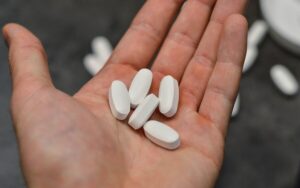
Are supplements giving you way more "vitamin C" (ascorbic acid) than you need?
In contrast, the recommended daily dose (USRDA) for Vitamin C is a meager 75 mg (for women) and 90 mg (for men): the equivalent of one orange, half of a bell pepper, a partial serving of broccoli, a cup of strawberries, or a serving of countless other fruits and vegetables.
While the USRDA is not my authority for how much I need, of healthy food (due to political issues at play), the point is: 3000 mg of Vitamin C, especially long term, is not natural and may actually be a bad idea.
So, where does that leave us? There’s certainly no need to restrict yourself to the USRDA (which is the absolute minimum amount of natural Vitamin C you should be getting each day), and if you’re eating a healthy diet that includes a variety of raw fruits and vegetables, you’re almost certainly meeting your nutritional needs — without exceeding the Food and Nutrition Board’s recommended safe upper limit of 2,000 mg.
There may also be times when you choose to supplement with larger doses of real, whole-foods-derived vitamin C to boost your immune system, head off a cold, or for other therapeutic reasons your functional medicine doctor may suggest. As long as you steer clear of synthetic ascorbic acid, this practice can be both safe and very helpful in fighting off harmful bacteria and viruses.
How the Body Uses REAL Vitamin C
Real, plant-based Vitamin C is as important to your health as corn-syrup ascorbic acid is dangerous. Getting enough plant-based Vitamin C from raw, whole foods sources that preserve nutrients and enzymes is instrumental in all of the following health benefits:
Skin Health
Vitamin C is absolutely critical to healthy skin15 that’s resistant to damage. Vitamin C is vital to collagen production, which gives skin its elasticity and “suppleness.”
Eating enough Vitamin C is also important for minimizing skin damage from the sun’s rays. While you’ll see plenty of products that apply Vitamin C to the skin topically, the evidence is scarce that this method is very effective. Eating a diet high in plant-based Vitamin C is the best way to achieve the life-long health benefits.
Brain Health
Vitamin C plays a vital role in the health of your brain.16 In fact, it’s so important that in times of scarcity, your body will divert any available Vitamin C to the brain in order to keep levels constant.
Ascorbate in Vitamin C helps protect the brain from oxidative stress, is required for neuron health and development, is vital to the proper function of key neurotransmitters, and reduces inflammation.

Vitamin C from plant sources plays a key role in brain health.
For all these reasons, Vitamin C is thought to be vital in the prevention of, and perhaps the treatment of Alzheimer’s disease, Parkinson’s disease, and Huntington’s disease.16
Metabolic Health
Vitamin C is closely tied to the production of L-carnitine, a molecule that helps you metabolize fatty acids and use energy efficiently. If you’re not getting enough plant-based Vitamin C, you may have more difficulty losing weight or efficiently turning food into energy.17
Wound Healing
Vitamin C is vital to healing wounds because of its role in forming connective tissue and collagen. Individuals who don’t get enough Vitamin C are slower to heal from cuts or other wounds, since Vitamin C is needed to form scars and regenerate healthy skin cells.
[Related: How to Use Coconut Oil for Wounds, Cuts, Burns, and Scabs]
Homeostasis
Antioxidants like Vitamin C play an important role in managing the balance between oxidants and antioxidants18 in the body any given time. Each organ in your body requires a unique amount of Vitamin C to function properly, and getting enough of this vital nutrient helps your body stay in homeostasis, with all systems working together properly.
Cancer Prevention
Speaking of antioxidants, Vitamin C’s status as a powerful antioxidant means that it can help neutralize the cell-damaging byproducts (oxidants) inside your body at any given point.18
These oxidants appear when the body breaks down sugar or fights viruses and bacteria, or when you breathe in polluted air or consume tainted foods. Left unchecked, oxidants can lead to cell abnormalities and mutations — and eventually, cancer.
Heart Health
Vitamin C deficiency has been linked with a higher chance of dying from heart disease.19 This vitamin is also important to maintaining a healthy lipid profile, and healthy blood vessel cells. That said, there’s not much evidence that taking mega doses of Vitamin C is any more beneficial than simply getting the right amount, on a regular basis, from whole foods.
Immune Health
Several different types of immune-system cells store Vitamin C20 (including killer-T cells and phagocytes). These cells need Vitamin C to work effectively and efficiently.
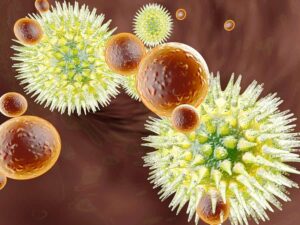
Vitamin C is important for immune system function.
Taking mega doses of ascorbic acid “Vitamin C” won’t result in a miracle, but making sure you’re getting enough Vitamin C from plant-based sources on a daily basis can help your immune system run at full capacity and fight off viruses and bacteria.
I do take 500 mg of Vitamin C a few times a day, when I feel a cold or virus coming on. However, I use only C supplements whose ingredient list is entirely the high-Vitamin-C superfoods and fruits, like amla, camu camu, rose hips, manoic root, acerola, and other berries.
Iron Absorption
Iron is absorbed in the intestinal tract. However, the presence of common minerals like calcium and phosphate can cause poor absorption. Vitamin C has been shown to significantly improve iron absorption21 in the intestinal tract, improving conditions like anemia.
Healthy Sources of Vitamin C
Naturally-occurring Vitamin C is plentiful. There’s little need to bother with corn-syrup derived nonsense (that’s only absorbed at about 10%!) when you can get the real deal, with around 90% absorption.
The following plant-based foods are rich in Vitamin C. Make them part of your daily diet in raw, unprocessed, and organic form whenever possible:
- Red bell pepper: 190 mg per cup
- Kiwis: 137 mg in two kiwis
- Mango: 122 mg per cup
- Green bell pepper: 120 mg per cup
- Broccoli: 120 mg per half cup
- Oranges and other citrus fruits: 60-100 mg per serving
- Papaya: 88 mg per cup
- Strawberries: 85 mg per cup
- Kale: 80 mg per cup
- Pineapple: 79 mg per cup
- Brussels sprouts: 75 mg per cup
- Potatoes (with the peel): 42 mg
What to Look for in a Vitamin C Supplement
If you’re looking for short-term, immune-stimulating therapeutic benefits of Vitamin C, look for one that comes from pure organic food sources, contains zero additives, and isn’t just isolated ascorbic acid (a red flag it was made in a lab).
Common high-quality Vitamin C supplements will have ingredients like acerola berry extract, amla berry extract, camu camu berry extract, and berry blends (e.g., cranberry, cherry, lemon, black pepper berry, raspberry, blueberry). These plant foods should be the only ingredients, if you choose to take a supplement!
How to Avoid Synthetic Vitamin C Supplements
Whether it’s Vitamin C or other vitamins and minerals, these rules of thumb can help you avoid consuming lab-processed supplements:
Read the Labels
Carefully read the back label on any supplement. If the list of ingredients isn’t very obviously whole foods (like vegetables and fruits and seeds), be very wary. Ironically, if “Vitamin C” is listed as an ingredient, that’s typically a red flag that the Vitamin C is synthetic,22 according to functional medical clinician Dr. Ben Kim.
Scrutinize “Natural” Claims
Even if a product’s label includes the word “natural,” you need to be wary. Manufacturers often use this word if only a small percentage of their product comes from actual whole food sources. The remaining percentage may be synthetic.
Look for Synthetic Keywords
If the supplement you’re looking at has a bunch of words ending in “ide,” or “ate,” you’re probably looking at lab-made ascorbic acid. These words indicate that a salt compound was created to stabilize a synthetic substance. You might see bitartrate, acetate, chloride, nitrate, gluconate, hydrochloride, or acetate.
Assume the Worst
A lot of products on the shelves boast high Vitamin C content. But if that product is processed or manufactured, chances are, it contains synthetic ascorbic acid--not real Vitamin C. That includes drug-store brands like Emergen C and Airborne, gummy snacks, fruit juices fortified with Vitamin C, and a whole host of other processed products.
Again, unless you’re seeing a whole-foods ingredient list, you can probably assume you’re getting corn-syrup derived ascorbic acid.
Summary: The Trouble with Ascorbic Acid
Real Vitamin C from raw, unprocessed plant sources is absorbed by the body at an incredible 70-90% and is critical to heart health, immune health, cell function, skin health, and brain function.
Lab-manufactured ascorbic acid, on the other hand, is a totally different story. Absorbed by the body 35% less effectively than natural Vitamin C, this corn-syrup derived frankenstein supplement has been linked to cancer, heart problems, and kidney stones, particularly in the mega-doses promoted by scientist Linus Pauling.
If you choose to supplement with Vitamin C, make sure you’re buying whole-foods-sourced Vitamin C — and reading labels very carefully. But above all else, make sure your diet includes lots of raw, organic foods high in Vitamin C, like bell peppers, kale, and oranges!
LISTEN NEXT: Check out my podcast episode with Dr. David Friedman, the expert cited in this article about ascorbic acid and Vitamin C. He debunks myths that many believe about supplements and food.

Disclosure: This post may contain affiliate links that help support the GSG mission without costing you extra. I recommend only companies and products that I use myself.
Sources
- Ballantyne, Coco. "Strange But True: Drinking Too Much Water Can Kill." Scientific American, June 21, 2007.
- Suttekiti Maruyama (1934). "Isolation of Vitamin C from Vegetables and the Relations between Vitamin C and Ascorbic Acid." Journal of the Agricultural Chemical Society of Japan, 10:10-12, 184-192, DOI: 10.1080/03758397.1934.10857103
- National Institute of Health. "Vitamin C Fact Sheet for Professionals." accessed Feb. 14, 2019.
- Reed, Anthony. "Will the Real Vitamin C Please Stand Up?" Medium, Nov. 8, 2016.
- J A Vinson, P Bose. "Comparative bioavailability to humans of ascorbic acid alone or in a citrus extract." The American Journal of Clinical Nutrition, Volume 48, Issue 3, 1 September 1988, Pages 601–604
- GreenSmoothieGirl.com. "Ep. 94: Food Sanity and Diet Wars with David Friedman." Vibe Podcast, Aug. 15, 2018.
- Agarwal M, Mehta PK, Dwyer JH, et al. "Differing Relations to Early Atherosclerosis between Vitamin C from Supplements vs. Food in the Los Angeles Atherosclerosis Study: A Prospective Cohort Study." Open Cardiovasc Med J. 2012;6:113-21.
- Thomas LDK, Elinder C, Tiselius H, Wolk A, Åkesson A. "Ascorbic Acid Supplements and Kidney Stone Incidence Among Men: A Prospective Study." JAMA Intern Med. 2013;173(5):386–388. doi:10.1001/jamainternmed.2013.2296
- Jacobs C, Hutton B, Ng T, Shorr R, Clemons M. "Is there a role for oral or intravenous ascorbate (vitamin C) in treating patients with cancer? A systematic review." Oncologist. 2015;20(2):210-23.
- Madhu G. Soni, T. Scott Thurmond, Edgar R. Miller, Tracey Spriggs, Adrianne Bendich, Stanley T. Omaye. "Safety of Vitamins and Minerals: Controversies and Perspective." Toxicological Sciences, Volume 118, Issue 2, 1 December 2010, Pages 348–355
- American Association For The Advancement Of Science. "Vitamin C Produces Gene-Damaging Compounds, Test-Tube Study In Science Reports." ScienceDaily. 15 June 2001.
- Nikolaidis MG, Kerksick CM, Lamprecht M, McAnulty SR. "Does vitamin C and E supplementation impair the favorable adaptations of regular exercise?" Oxid Med Cell Longev. 2012;2012:707941.
- Zeratsky, Katherine, Rd. "Is It Possible to Take too Much Vitamin C?" Mayo Clinic, accessed Feb. 17, 2019.
- Friedman, David. "Food Sanity" Basic Health Publications, Feb. 20, 2018. pg. 186.
- Pullar JM, Carr AC, Vissers MCM. "The Roles of Vitamin C in Skin Health." Nutrients. 2017;9(8):866. Published 2017 Aug 12.
- Harrison FE, May JM. "Vitamin C function in the brain: vital role of the ascorbate transporter SVCT2." Free Radic Biol Med. 2009;46(6):719-30.
- Johnston CS, Corte C, Swan PD. "Marginal vitamin C status is associated with reduced fat oxidation during submaximal exercise in young adults." Nutr Metab (Lond). 2006;3:35. Published 2006 Aug 31. doi:10.1186/1743-7075-3-35
- Figueroa-Méndez R, Rivas-Arancibia S. "Vitamin C in Health and Disease: Its Role in the Metabolism of Cells and Redox State in the Brain." Front Physiol. 2015;6:397. Published 2015 Dec 23. doi:10.3389/fphys.2015.00397
- Moser MA, Chun OK. "Vitamin C and Heart Health: A Review Based on Findings from Epidemiologic Studies." Int J Mol Sci. 2016;17(8):1328. Published 2016 Aug 12. doi:10.3390/ijms17081328
- Andreas Hahn, Alexander Ströhle. "Vitamin C and Immune Function." Med Monatsschr Pharm. 2009 Feb; 32(2): 49–56.
- S. R. Lynch, J. D. Cook. "Interaction of vitamin C and iron." Ann N Y Acad Sci. 1980; 355: 32–44.
- Food Matters. "5 Ways to Tell If Your Vitamins Are Real or Fake." Jan. 7, 2013.
Posted in: Reviews, Supplements, Whole Food



